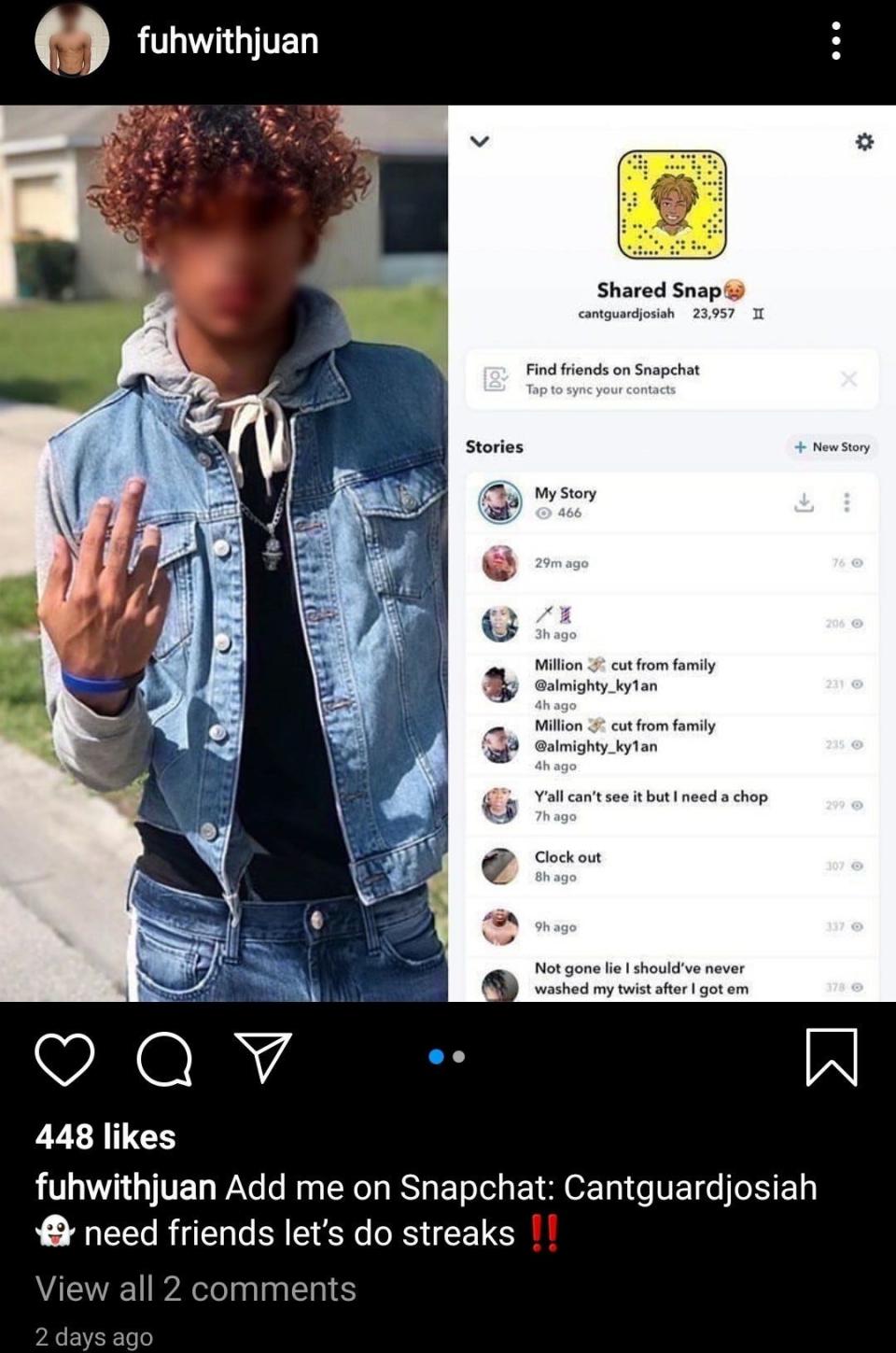Volusia joins 650 school districts in suing social media giants, citing mental health harm

Volusia County Schools is one of at least 12 districts in Florida and 650 nationwide that are suing Meta, the parent of Facebook and Instagram, as well as other social media companies, alleging they have done harm to children's mental health and burdened educators.
Social media companies' addictive algorithms have contributed to a decline in mental health, and districts are having to hire more people and create new policies and plans, as a result, the suit argues, and schools need to be compensated.
"What we've heard from (Volusia) and districts across the country is in the past 10 years, they've been dealing with the impact of social media on their campuses," William Shinoff, one of the lawyers who represents Volusia County and other districts, said in a recent interview. "It's been a disruption to the learning environment."
Tiktok, Snapchat, YouTube and the Meta platforms have hooked teens, leading to an increase in anxiety, depression, eating disorders and suicide, Shinoff said.
How school districts are left to pick up the pieces
Other personal injury cases brought by families and individuals are also being brought against the social media giants. Shinoff said his firm, Frantz Law Group of San Diego, is handling some of the school district filings in U.S. District Court of Northern California, near the Facebook and YouTube headquarters.
"The largest harm is with children, but which public entity is responsible for helping with the children? It's schools, so we believe this is the most appropriate plaintiff," he said.
Volusia County Schools officials, including the board chair, board attorney, superintendent and general counsel, would not comment on why Volusia joined the lawsuit. The school board voted unanimously to join the suit on March 28, upon the recommendation of Superintendent Carmen Balgobin.
The Volusia lawsuit – like others – claims not just that social media companies are a public nuisance, but that they have been negligent on matters such as enforcing age requirements, while also violating the RICO Act.
RICO – or Racketeer Influenced and Corrupt Organizations – is the same law used by feds to bring down organized crime, and the means by which Fulton County Georgia District Attorney Fani Willis is attempting to convict former President Donald Trump and 18 others, alleging they schemed to overturn the 2020 election.
The lawsuit alleges the social media companies have engaged in racketeering and fraudulent business dealings by misleading the public on the mental-health dangers for youth users and withholding their own research on the matter, as well as claiming they don't market to children and teens while manipulating their sites to cause more excessive engagement.
Although the complaint was filed in April, the defendants have not yet responded or made any motions to dismiss.
Hooking users through brain rewards
There are 15 defendants, each affiliated with the major platforms used by young people: Facebook, Snapchat, Instagram, TikTok and YouTube.
Those sites “have maximized the time users – particularly minors – spend on their platforms by purposely designing, refining and operating them to exploit the neurophysiology of the brain’s reward systems to ensure users come back frequently, and remain on the respective platforms for as much time as possible.”
The suit cites a Harvard University study showing social media exploits “the same neural circuitry” as “gambling and recreational drugs to keep consumers using their products as much as possible.”
Nine in 10 children between the ages of 13 and 17 use social media, the suit states. And 38% of children ages 8 to 12 used social media in 2021.
Moreover, minors’ brains are not fully developed, leaving them susceptible to being manipulated by the sites.
The suit calls the defendants’ misconduct “a substantial factor resulting in a youth mental health crisis,” including increased anxiety, depression, thoughts of self-harm and suicidal ideation.
In May, U.S. Surgeon General Vivek Murthy released an advisory on social media and youth mental health.
"While social media may offer some benefits, there are ample indicators that social media can also pose a risk of harm to the mental health and well-being of children and adolescents," he wrote.
And the Centers for Disease Control and Prevention reported a steady and then accelerated increase in almost every category of risk for mental health disorders even before the pandemic, between 2011 and 2021, as YouTube, TikTok and Snapchat grew in popularity.
Those sites’ algorithms make children more vulnerable to cyberbullying and criticism, the suit claims.
“Defendants’ design, advertising, marketing and operation of their social media platforms and products target minors, and that these platforms are intentionally and deliberately designed to exploit and cause minors to become addicted, which has caused harm (to the plaintiffs).”

Of the all social media defendants, just one responded to requests for comment. A Snapchat communications official provided a statement.
"Snapchat was designed differently from other social media platforms because nothing is more important to us than the well-being of our community," the statement reads.
The Snapchat app encourages communication between "real friends" by opening to a camera, rather than a feed that "encourages passive scrolling," the company states.
Roy Balleste, professor of law and director of the Dolly & Homer Hand Law Library at Stetson University, called the school boards' suit "interesting" as comes from the nexus of technology and mental health.
"This lawsuit may force legislators to take a closer look and perhaps modify federal laws to deal with the problem," said Balleste, whose expertise includes internet governance.
U.S. Sen. Rick Scott, in an appearance in DeLand on Aug. 9, told The News-Journal it's been "frustrating that Congress has failed to act in regulating social-media companies.
"There's been a lot of bills proposed. We haven't gotten anything done yet," Scott said. "I'm hoping we can get something done in the next few months."
Volusia's new restrictions on phone usage
In Volusia County Schools, a new policy requires students in middle and high schools to turn off ringers and stow their phones away in bookbags or purses during instructional hours. The policy comes on the heels of the Legislature's unanimous passage of House Bill 379, co-sponsored by Rep. Tom Leek, R-Ormond Beach, which also requires districts to instruct students on social, emotional, and physical effects of social media.
Jessica McIntyre, coordinator of mental health services for Volusia County Schools, said the new policy has worked well thus far.
"I know that the teachers, the staff … they notice more students walking through the hallways with purpose. They are able to socialize, where they weren’t really doing that," McIntyre said.
Jason Wheeler, a spokesman for Flagler County Schools, said that district has not filed suit against the social media firms and has no plans to do so.
Other Florida school districts involved in lawsuits against social-media companies include Bay, Broward, Citrus, Lee, Liberty, Madison, Okeechobee, Orange, Pinellas, Sumter and Walton. Shinoff expects the list to grow.
Bay County School Board Attorney Franklin Harrison has spoken with school boards around the state about the lawsuits.
In May, he cited a saying to the Orange County School Board: If the product is free, then you are the product.
"Our kids become the product of these companies and they sell it," Harrison said. "They make a lot of money."
Cathleen Brennan, a spokesperson for Broward County Schools, said as a rule, district officials do not comment on pending litigation, but she provided information from the district's general counsel explaining why they filed the suit.
The summary notes that incidences of depression and suicide are among the factors defining the mental health crisis Broward County youths face, while social media platforms amplify "harmful divisive material" to maximize ad revenue.
"The dangerous effects of defendants’ conduct on Broward County’s youth and schools cannot be ignored," according to the Broward schools' attorneys. "These social media giants can and should take measures to stem the tide of the mental health crisis afflicting America’s social media-addicted youth."
Social media companies have long sidestepped lawsuits by citing Section 230, part of the U.S. Code that was enacted as part of the Telecommunications Act of 1996. The act was designed to kickstart the internet economy and largely provided companies like Facebook and Snapchat immunity for user-generated content.
Getting school districts funding to provide mental health resources for their students is one part of what the plaintiffs are asking, Shinoff said.
Resolution: Volusia County Schools, teachers union settle contract
"Unfortunately for them now, that doesn't solve the problem. Money is a band-aid. We are also seeking to change the business practices and policies of these companies so we can stop what's going on, and make these platforms safer for children," he said. "At the end of the day, we know social media is not going away."
After Franklin's presentation, the Orange County School Board voted to join with other districts in becoming plaintiffs.
"I'm very excited about this litigation," Harrison said. "I think it is righteous. I think there's a lot of money being made and there's a lot of harm, and school boards are dealing with this every day. Hopefully we can get some accountability and maybe we can get some controls."
Heat Days: When is it too hot for recess and PE? What the Volusia County Schools system says
This article originally appeared on The Daytona Beach News-Journal: Volusia district sues social-media giants Facebook, TikTok, YouTube

